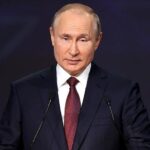Doing business in Hong Kong increasingly comes with a new risk: the political cost of upsetting Beijing.
Chinese clients recently dropped one big Chicago law firm after it recused itself from a politically sensitive case. A former Wall Street banker was muzzled for writing a “Hong Kong is dead” column. And Google was effectively cornered into enforcing a ban on a popular protest anthem.
In all areas of life, Hong Kong is hewing closer to mainland China, blurring distinctions that once cemented the city’s status as mostly free from the politics of Beijing. Legal rulings echo the courts in mainland China. City regulations follow edicts in Beijing. Even government banners recall Chinese Communist Party slogans.
The city’s transformation is being driven by a national security law imposed by Beijing in 2020 and additional legislation passed by Hong Kong lawmakers in March. Both have dealt a blow to the partial autonomy promised by China when it took possession of the city from Britain nearly three decades ago.
The work of lawyers, bankers and other professionals now risks coming under scrutiny for “external interference,” an offense that has become criminal. The new dynamic, together with rising tensions between China and the West and an economic downturn in China that has decimated much of the deal-making that once made Hong Kong tick, is casting a pall over the city’s once lively economy.
The changes are pushing some foreign firms to leave or sharply scale down their operations in the city.
The New York Times










